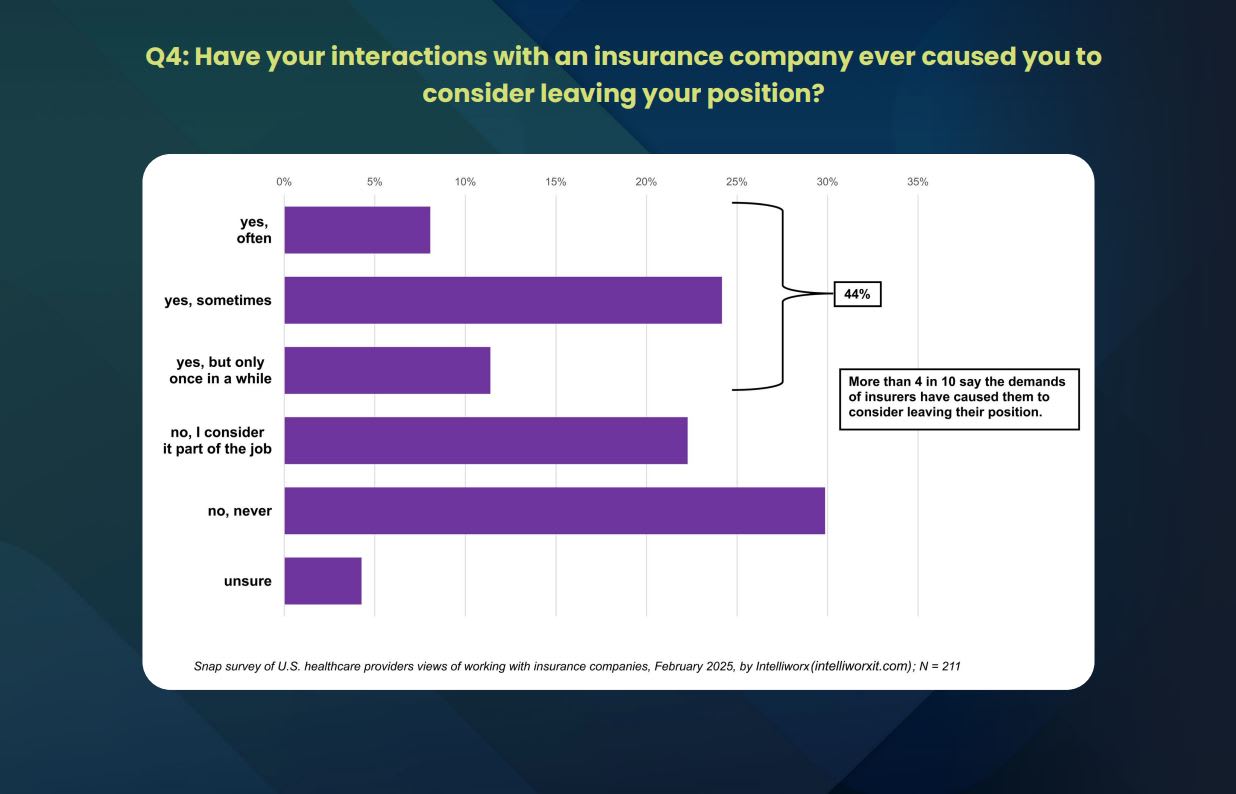When healthcare insurers deny treatments it can derail a healthcare provider’s day. Suddenly, they are thrust into a forum where they have to justify their medical decisions. Many providers say this happens too frequently and takes up too much time.
That’s according to a new survey of 211 U.S.-based healthcare providers published by Intelliworx. Respondents were solicited through an independent survey panel between January 30, 2025, and February 4, 2025.
The survey may well serve as a call to action for healthcare employers as well.
While many providers say their employers are supportive, there is a substantial percentage who say employers could do more to help them manage this challenge. What’s more, the frustration has grown to the extent that nearly 4 in 10 providers have considered quitting.
“Given the persistent and prolonged shortage of healthcare talent, this could be an opportunity for savvy employers to stand out among rivals,” said Patrick Youngblood, DBA, SPHR. “Those who are willing and able to find creative solutions to ease the strain providers face in complying with payer demands could be a boost to provider recruiting and retention.”
Youngblood has extensive experience recruiting providers to rural areas. In addition, his Doctor of Business (DBA) thesis focused on solving the challenges of recruiting and retaining healthcare providers in rural America.
Key findings from the survey are as follows:
1. 74% of healthcare providers say insurers deny covering treatments at least some of the time
Nearly 3 out of 4 healthcare providers (74%) say health insurance companies decline to cover prescribed treatments at least some of the time. Further, more than 1 out of 3 (36%) say this happens “frequently” (9%) or “very frequently” (27%).
On the flip side, just 15% say this happens “rarely” (12%) or “never” (3%). This cohort is in the minority, so it’s reasonable to conclude this happens all too often – from a provider’s perspective.
Suggestion: Healthcare employers should run a similar survey within their own organization. The results would provide a baseline for the sentiment among your providers. In addition, interviewing those providers who say this is an infrequent occurrence may reveal what this cohort is doing differently. Such findings would be valuable to share across the team.
2. 45% of healthcare providers say they are required to spend too much time persuading insurers
Nearly half of the healthcare providers surveyed (45%) say the time intensity of persuading insurers to cover prescribed treatment plans is too much. Of this cohort, 1 in 5 (20%) expressed strong dissatisfaction with the amount of effort they are forced to pour into insurance matters.
Conversely, 31% indicated such engagement with payers is just part of the job. Indeed, 9%, or nearly 1 in 10, signaled the level of effort is just right.
Suggestion: Healthcare employers should explore this question with their own employees. The key to looking for is if the differences in perception match the physical tangible actions. For example, of those providers who feel the time required of them on insurance issues is reasonable – do they enter better notes – or do insurers simply have overzealous expectations?
3. 50% of providers say healthcare employers could do more to address insurance demands
Exactly 5 in 10 healthcare providers (50%) surveyed say their employers could do more to ease the burden they face in meeting insurance demands. About a quarter of respondents (27%) feel their employers do help enough and another 17% are indifferent.
Since the answers range across a Likert scale, the degree of variation is important to examine. Here’s how the numbers break out semantically:
- 27% say “my employer is adequately supportive;”
- 36% say “my employer is mostly supportive but could do more;”
- 9% say “my employer is a little supportive but could do a lot more;”
- 17% say “my employer is neither supportive nor unsupportive;”
- 4% say “my employer is not supportive at all;” and
- 7% say they are “unsure.”
Suggestion: A simple way healthcare employers can make a difference is to periodically ask the providers you employ how you can help. However, you must also put some of those suggestions into action, or the effort can backfire. Keep an open mind about providers’ suggestions and strive to experiment with as many as feasible.
4. More than 4 out of 10 healthcare providers have considered quitting their jobs over insurance demands
Some 44% of healthcare providers have considered leaving their positions as a result of the insurance demands. Even more concerning, about 1 out of 3 (32%) have considered it with some frequency, including “often” (8%) and “sometimes” (24%).
It’s worth pointing out that the majority of respondents (52%) indicated they wouldn’t quit. This cohort includes 22% who say dealing with insurance is just “part of the job” and another 30% who have simply “never” considered leaving – over insurance.
Suggestion: Few healthcare employers have enough providers on staff. It’s expensive, hard and time-consuming to replace even one provider – let alone up to 44% as this survey suggests. Addressing these concerns in tangible and practical ways can help provider retention.
Moreover, those healthcare facilities that do stand to attract providers who are burned out with what feels like a constant battle to deliver the proper care to their patients. Addressing their concerns and making it a point to highlight the solutions you’ve implemented as part of a methodical and well-organized recruiting process.
5. In their own words: what providers say they would change about healthcare insurance
The final question of this snap survey was open-ended and optional. We asked providers the following question: “If you could change one thing about healthcare insurance what would it be?”
Of the 212 total responses, 208 took the time to write in answers. Below is a sample of some of their verbatim responses. The word cloud depicting an analysis of all written responses to this question is the top image for this post.
- “That they support the patient more and spend less time trying to save money.”
- “The provider makes the decisions of what is best for the patient, not the insurance company.”
- "They would be more agreeable to what the physician is prescribing to help the patients.”
- “Make them stop thinking they are doctors when they do not know the best treatment for patients.”
- “To stop questioning why something is needed. To do away with Prior Authorization on medications, nothing worse than sending a patient home to get a call [because] their insurance wants approval before they will pay. If something is needed or prescribed, the doctor and team know what is best for the patient.”
- “Listen to the professionals and not waste time/money requiring totally unnecessary and pointless treatments. Delays proper care for the patient and costs way more than simply doing what is necessary for the proper treatment.”
- “It would be to never deny a cancer patient the lifesaving treatment they deserve.”
* * *
The survey is freely available online in HTML format here: Healthcare providers express frustration with payers over denied treatments [survey].
A PDF version is also available with registration.
About Intelliworx
Intelliworx (formerly HRWorx, LLC) provides workflow management software that helps customers automate business processes such as financial disclosure, telework, credentialling, onboarding, and workflow, among others. The company got started 20 years ago by converting complex forms into intelligent interviews – similar to the way tax software simplified tax filing for consumers. Today, it’s evolved from a simple tool for data collection to a platform that supports entire processes IT modernization and improves the customer experience (CX).
Intelliworx develops technology solutions for the U.S. Government, state and local governments and to rural private sector healthcare facilities. It has provided purpose-built software to federal government agencies has earned the authorization to operate (ATO) in the government cloud from 40 separate federal departments and agencies. The company is FedRAMP-authorized and a certified service-disabled veteran-owned small business (SDVOSB).
To learn more visit us online at www.intelliworxit.com. The company is active on social media sites including LinkedIn and X.
Media Contact:
for Intelliworx
Frank Strong
+1 202-352-5920
[email protected]




